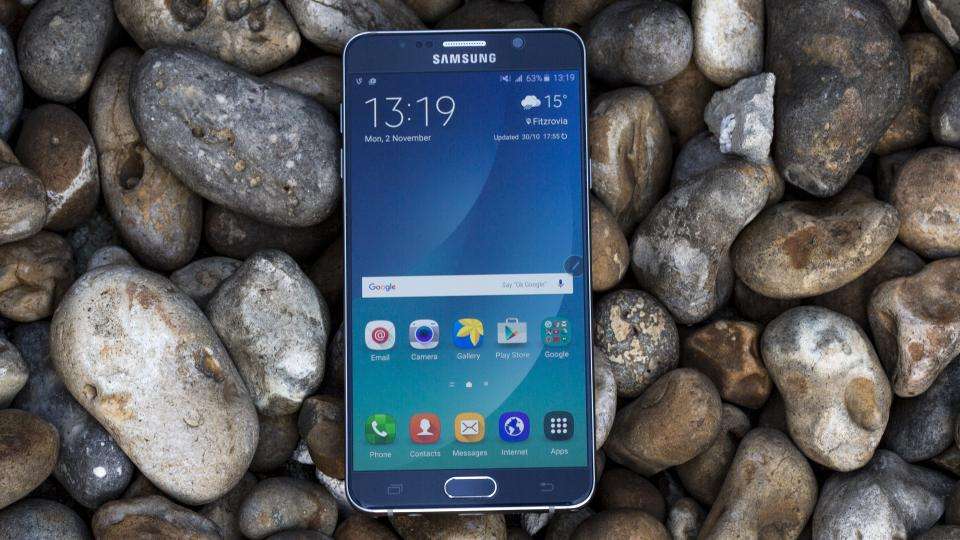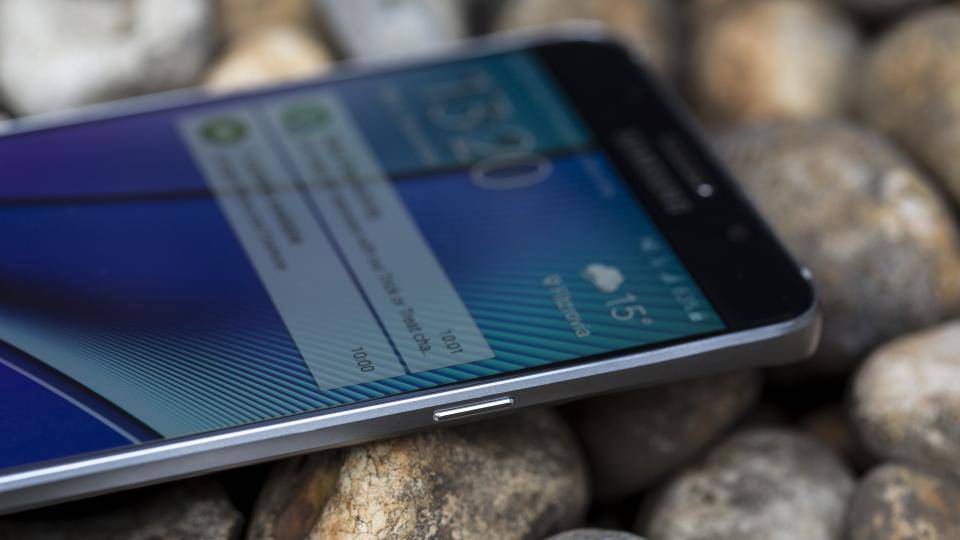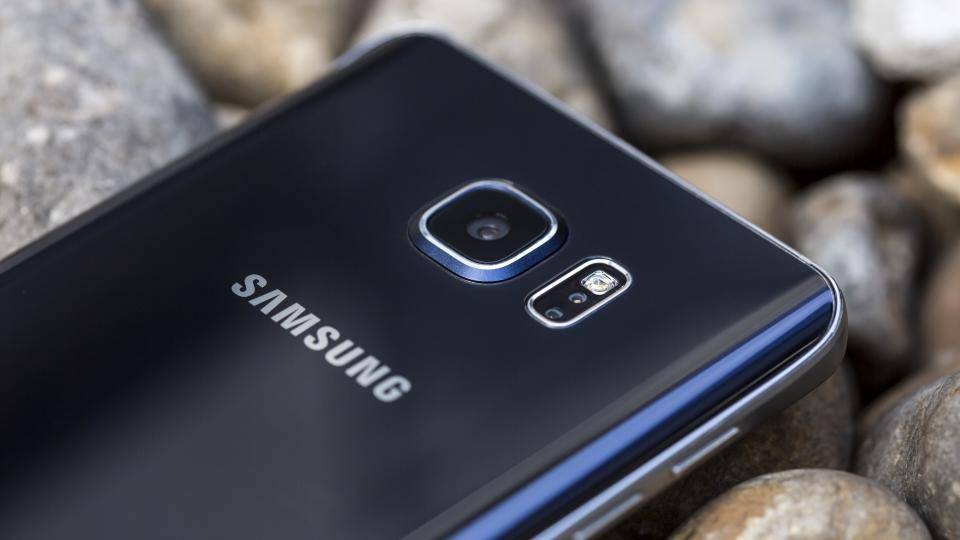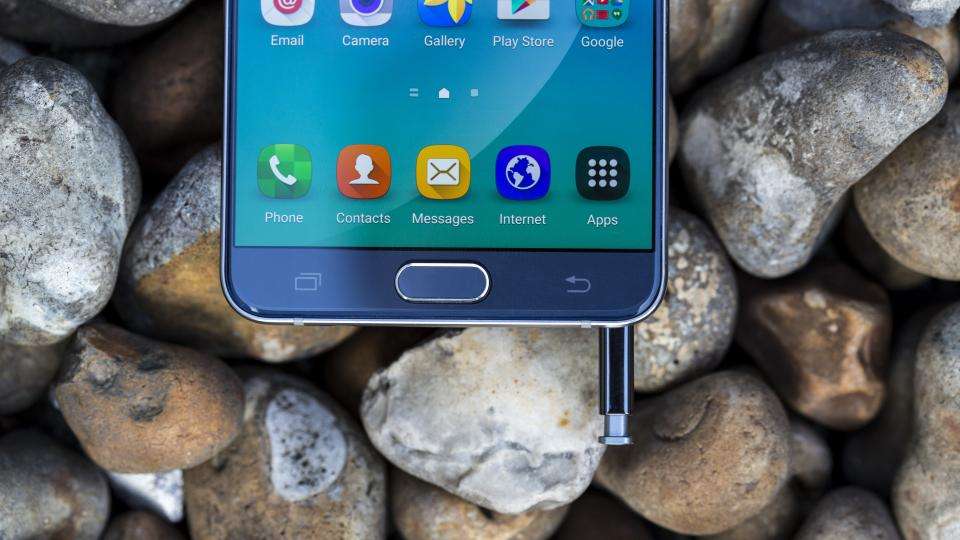In 2015, Samsung released the Galaxy Note 5, a phablet that didn't have a global release. In the UK, you had to make do with the Galaxy S6 Edge+ instead, if you wanted a large Samsung phone. Of course, if you really wanted the Note 5, you could have imported it - now you'll be able to find a limited supply of the phone through various online retailers from around £440 .

At the time, I managed to get hold of one via Mobile Fun , so I've put it through all our usual tests to see what you're missing out on, whether it's worth waiting for, or whether you should just go for the S6 Edge+ instead.
Samsung Galaxy Note 5 review: Build quality
It’s a shame that we’re not getting the Note 5 at the moment, as the build quality has been dramatically improved since the excellent Galaxy Note 4 . Rather than a faux leather rear, Samsung has used a glass back and front this time round, complete with a metal frame. Essentially, the Galaxy Note 5 is the larger version of the Galaxy S6 , just as the S6 Edge+ is the larger version of the S6 Edge .

The metal frame certainly lends it an air of durability, but its curved edges feel rather too slippery for me. Just like the normal S6, I don't really feel that confident with it when I'm holding it with one hand, as the glass back provides no grip whatsoever. As a result, it can slide around on your palm very easily, and its wider frame makes it that bit more difficult to grip firmly than the S6.
Samsung Galaxy Note 5 review: S-Pen
This is vital when it comes to using the S-Pen, the Note 5's integrated stylus, as you'll be holding the phone in your non-dominant hand. It's fine if you've got big hands and can hold the Note 5 securely, but those with smaller hands may find it a bit more difficult to manage. I found myself being overly cautious with the Note 5 when using the S-Pen, as I worried I was going to drop it. This doesn't exactly inspire much confidence, especially when the phone is so expensive.

This is a shame, as the pen itself is much easier to use than before. It's been redesigned since the Note 4's S-Pen, and is now spring-loaded so all you need to do to start using it is push down on the rear of the pen and it will pop out of its cubby hole in the bottom of the phone. Its thin, rectangular shape is extremely comfortable to hold, and it's quick and easy to write with. Even better, the screen's built-in palm rejection means you can rest your hand on the screen without making any accidental marks on the page.
Click the pen's button and you'll bring up Samsung's newly redesigned Air Command wheel, which gives you app shortcuts to S Note, Screen Write, Smart Select and Action Memo, but you can also add two shortcuts of your own choosing, like Microsoft's OneNote, for instance, which comes pre-installed on the handset.

This works particularly well with Screen Write (which takes a screenshot of whatever you're looking at and lets you write on it) and Smart Select (which lets you crop and save any part of the screen), as you can then add your own personal annotations in OneNote to send to friends and family or view on the big screen when you get back to your laptop.
^ Tap the S-Pen's button and Air Command will pop-up instantly, allowing you to access several pen-friendly app shortcuts
Samsung Galaxy Note 5 review: Display
There’s little difference in the screen between the Note 4 and the Note 5, with both having a 5.7in, 2,560x1,440 resolution display, providing a pixel density of 518ppi. This may not be the highest pixel density around these days, but it still provides more than enough detail for any conceivable use. The big screen and high resolution also let you take full advantage of Samsung's Multi-Window feature, which lets you use two apps side by side.
This is particularly handy if you want to send a text while looking at Google Maps, or quickly look something up on IMDB while you're watching a video clip, and you can adjust the size of each app to your liking on the fly, too. App support is spotty though, for example there's Google Maps, Chrome, WhatsApp, Skype and Twitter, but no Inbox (the new Gmail interface), Keep or Netflix.
Of course, with a Super AMOLED panel, image quality is excellent. Samsung's panels have long returned superb scores in terms of colour reproduction, and the Note 5 is no exception, covering a full 100% of the sRGB colour gamut and delivering perfect 0.00cd/m2 blacks. Its contrast levels are also super high, returning a contrast ratio of infinity:1, giving images plenty of detail along with bright, vibrant colours. As with other S6-series phones there are colour presets provided, so you can tweak how colours are shown onscreen, from highly accurate to really vivid and punchy.
The Note 5's screen is also much brighter than the regular S6 handsets, as I measured a peak brightness of 406.85cd/m2. This is quite high for an AMOLED display, so it should be easier to use outside. However, like Samsung's other flagships this year, the Note 5 has a hidden brightness trick. While its maximum manual brightness might only reach 400cd/m2, switching to Auto will make it shine much brighter under the right lighting conditions, such as when you're outside in bright sunshine. With the summer months now firmly behind us, I simulated the effect by shining a torch over the Note 5's ambient light sensor, and sure enough the screen almost doubled in brightness straight away.
Of course, this will drain the battery pretty quickly if used for long periods of time, but it's nevertheless a really handy feature to have, as it effectively combines the best of both AMOLED and LCD screen technologies to create a brilliant, yet versatile display you can see in all lighting conditions.











